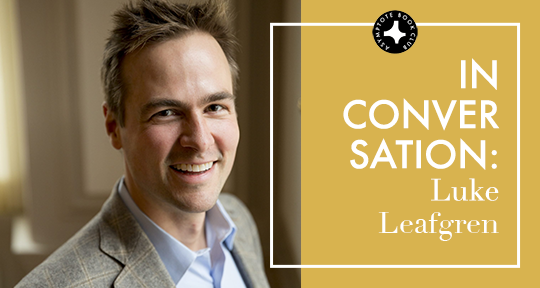In silhouettes, clouds, mist, and partially veiled names, this novel by Najwa Barakat speaks of the underbelly of Beirut through a cloud-shrouded figure dwelled by demons of his own writings. As our Book Club selection for May, Mister N is a story of what writing can and cannot do to us, how it resonates through individuals and communities, moving through borders both physical and psychological.
The Asymptote Book Club aspires to bring the best in translated fiction every month to readers around the world. You can sign up to receive next month’s selection on our website for as little as USD15 per book; once you’re a member, join our Facebook group for exclusive book club discussions and receive invitations to our members-only Zoom interviews with the author or the translator of each title.
Carol Khoury (CK): Since 2014, you have translated six Arabic novels into English, three of which are by Muhsin al-Ramli, and two by Najwa Barakat (the sixth by Shahad al-Rawi). Barakat is Lebanese, while al-Ramli and al-Rawi are Iraqi. One obvious theme between these writers is their coming of age during various wartimes, and furthermore, all of the novels are to an extent shadowed by, if not immersed in, themes relating to war. How do you choose the novels you want to translate?
Luke Leafgren (LL): The first few novels that I translated were all very random—things that came my way. I started translating when I was about thirty, about twelve years ago; I was finishing my dissertation, and I needed something more enjoyable to do—some kind of creative outlet. When I expressed an interest in translation, one of my Arabic teachers at Harvard, Khaled al-Masri said, said: “I’ve got a friend, Muhsin al-Ramli, looking for a translator for his second book. If you like it, I can introduce you.” I read it, and, you know, I could hear how it might sound in English, and I felt like I related in some ways to the protagonist. That was how I translated my first novel. After that, Khaled introduced me to Najwa.
It’s only been after receiving The Saif Ghobash Banipal Prize that I’ve been able to think more about projects that I would choose and which directions to go. Thinking about novels that I would choose, I feel a certain loyalty to authors I’ve translated already; I feel gratitude to them, and I believe in them, so I could imagine translating more novels by writers I have worked with in the past.
CK: Was Najwa Barakat involved directly in the process of translating this book?
LL: We have an email connection, so she was ‘involved’ in the sense that I could send her questions. As I translate, I make a very quick rough draft, highlighting in the Arabic text passages or words that I want to come back and focus on. Then I make lists of queries, and those lists I often prioritise, because I can’t ask everything; I’ll send them my top questions, and then that might resolve some other questions, then if necessary, I’ll come back with maybe another set. Najwa was very encouraging and supportive, but I think she had a certain amount of trust in my translation as well.
CK: Your BA degree is in English and theology, and in Mister N., Barakat employs several religious symbols, mainly from Christianity, but also Islam. What is your take on the numerous biblical connections in the text—Lazarus, in particular? It seems to me that the real function of this tale within Mister N. is not the awakening after death (resurrection), but rather Lazarus’ disapproval of it.
LL: For my whole life I’ve been taken by the power of stories, and I think one aspect I especially appreciated was the way literature and religion interact—how religious ideas can shape literature or how texts can be used to communicate questions or beliefs. And that attracts me to this novel as well. I was very interested in the figure of Lazarus and how that figure is being used, and I think you’re right—it’s not so much about the resurrection. It’s asking a question I hadn’t come across in other contexts: of whether or not Lazarus really wanted it, of his impression after being called back to this world, his reactions and accounts. Mister N somehow sees this tale as a symbol, a representation of himself. The dirt in Lazarus’ mouth is being compared to the way words are getting tangled in Mister N.’s mouth, as a symbol for madness or writer’s block. The utility of that religious imagery is an excellent example of how a writer can tap into biblical narrative power and drama, while also kind of subverting it and challenging it. It’s a very effective technique. READ MORE…

